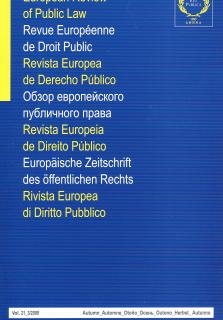
Jurisprudence
Constitutional / Constitutionnelle
2007-2008
Belgium / Belgique
Assistante en droit constitutionnel à la Faculté de droit de l’Université Catholique de Louvain et collaboratrice politique aux affaires institutionnelles du Centre Démocrate Humaniste (cdH)
This chronicle concerns the decisions pronounced by the Belgian Constitutional Court in 2007 and 2008. It goes over the main decisions pronounced by the high constitutional jurisdiction during this period, both in the field of constitutional litigation sensu stricto and the litigation on rights and freedoms. The first section is devoted to questions relating to the Court’s competence and the ways for the referral of a case before the Court, amongst which special attention is paid to the admissibility of an application for annulment and to the requests for suspension. The second concerns the mission of control of rights and freedoms the Constitutional Court is invested with and, more in particular, of the principle of equality and non-discrimination, of the right to a fair trial and of the social, economic and cultural rights laid down in Article 23 of the Belgian Constitution. The majority of these decisions confirm or specify a previous case law. Others present, on the contrary, the peculiarity of resolving new issues of constitutionality. To mention only some, we can refer more in particular to the ruling which sets forth the consequences for the judge a quo of a finding of unconstitutionality resulting from a legislative gap or the ruling on the “corresponding obligations” that can be taken up by the person entitled to a decent housing.
Cette chronique a pour objet les arrêts rendus par la Cour constitutionnelle belge durant les années 2007 et 2008. Elle reprend les principales décisions prononcées par la haute juridiction constitutionnelle au cours de cette période, tant dans le domaine du contentieux constitutionnel sensu stricto qu’en matière de contentieux des droits et libertés. Le premier axe est consacré aux questions relatives à la compétence de la Cour et à ses modes de saisine, parmi lesquels une attention particulière est accordée à la recevabilité du recours en annulation et aux demandes de suspension. Le second a pour objet la mission de contrôle des droits et libertés dont la Cour constitutionnelle est investie et, plus particulièrement, du principe d’égalité et de non-discrimination, du droit à un procès équitable et des droits sociaux, économiques et culturels consacrés à l’article 23 de la Constitution belge. La plupart de ces décisions confirment ou précisent une jurisprudence antérieure. D’autres présentent au contraire la particularité de trancher de nouvelles questions de constitutionnalité. Pour n’en citer que quelques-uns, il s’agit notamment de l’arrêt qui énonce les conséquences pour le juge a quo d’un constat d’inconstitutionnalité résultant d’une lacune législative ou de celui qui se prononce sur les “obligations correspondantes” qui peuvent être mises à charge du bénéficiaire du droit à un logement décent.





















